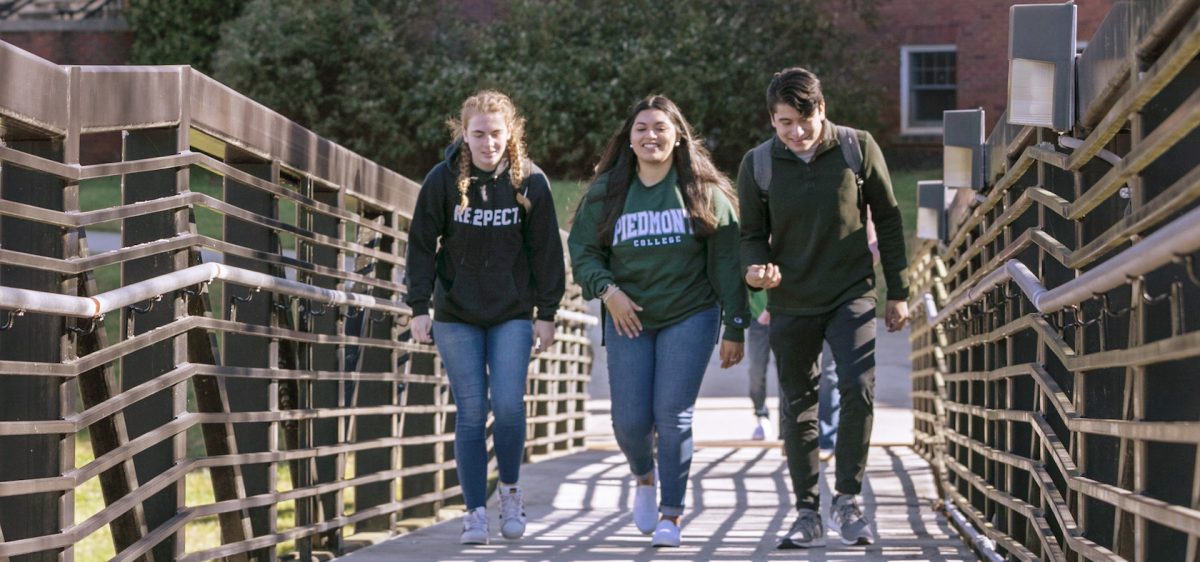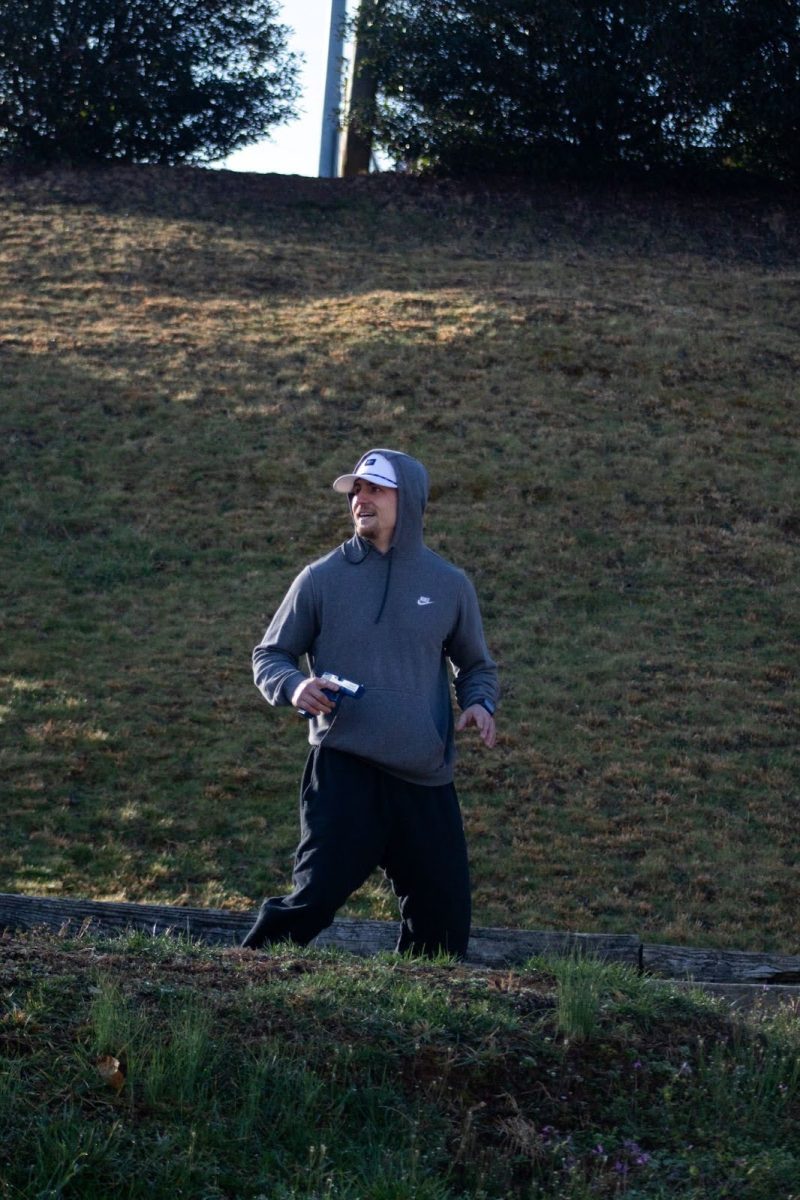It’s a typical Friday night for the underage drinker at Piedmont. She heads to one of the local gas stations or drives to the liquor store in Cornelia, hoping to score some alcohol. A 21-year-old friend rides along to purchase, while the underage student’s cash burns a hole in her pocket.
However, some, more daring underage students will try their hand at purchasing their own alcohol, and they will succeed.
Although Piedmont is a dry campus, it’s common knowledge that students are drinking on campus, and many of them are underage. Piedmont has been notorious for alcohol violations in the past. From 2009 to 2011, there were 35 combined arrests for alcohol violations on campus, according to a Clery Act report from the campus police department.
In August 2012, according to an article in The Navigator, the administration elected to change the way Piedmont deals with on-campus alcohol violations. Underage students caught under the influence could be placed in a holding tank on campus, avoiding arrest.
However, this academic year, The Navigator reported that Piedmont College administration decided to revert back to the old alcohol protocol: arresting underage drinkers on campus. Students over the age of 21 can now also be arrested for providing alcohol to minors.
Piedmont may have changed its alcohol procedure, but does it have the community’s support?
According to the state’s 2012 Report to Congress on the Prevention and Reduction of Underage Drinking, 43.6% of 18 to 20 year-olds used alcohol in the past month, and 30.5% reported binge alcohol use.
Underage students use three main methods to obtain alcohol: purchasing from stores that don’t check for identification, using fake IDs or paying friends who are 21 or over to buy for them.
Card Me: Are locations selling without checking IDs?
One student, a 19-year-old sophomore, claimed that obtaining alcohol underage is fairly easy for Piedmont students if the location doesn’t check for ID.
“I have bought from around PC [without being carded]” she said.
There are 83 stores and restaurants that have licenses to sell alcohol in Habersham County and the cities of Demorest, Mt. Airy, Clarkesville and Cornelia. This number does not reflect licenses issued to non-profits and other organizations hosting special events where alcohol is sold. Demorest, a town ironically named after an internationally famous alcohol prohibitionist, is home to two local stores that are licensed to sell alcohol, including Express Mart #1 and H & H Convenience Store, both located on Central Avenue. Students may recognize these locations as the Exxon and BP gas stations, respectively.
Alcohol licenses are issued by taxing jurisdiction, and the Georgia Department of Revenue (DOR) maintains a database of all licenses issued in the state.
Carter Leverette, Assistant Chief of Operations for the Georgia DOR’s Alcohol and Tax Division, said that the state entity is not only responsible for issuing licenses, but also for making sure businesses are in compliance.
“Our special agents check licensed locations,” said Leverette. “They also go out and do undercover checks. The agents are required to perform [checks] on a regular basis, as well as respond to complaints.”
Georgia’s Report to Congress on Underage Drinking notes that, in 2010, 4,349 licensees were compliance checked by state agencies. Of these, 711 failed.
The Habersham County Department of Planning and Zoning records liquor licenses issued in the county. According to Director Tom Braswell, there are no liquor license citations in the incorporated county.
Local law enforcement agencies also perform compliance checks to make sure businesses aren’t selling to underage patrons. The Habersham County Sheriff’s Department, as well as the city police departments, perform these checks. “We try to send someone in who either has a fake ID or without an ID who looks young to try to purchase alcohol,” said Habersham County Sheriff Joey Terrell.
Terrell said that his department has not found many locations in violation of selling to people under 21. “I don’t know of any…in the last year,” he said.
According to the state congressional report, the underage purchase of alcohol can lead to a driver’s license suspension for up to 180 days. For retailers, a sale to a minor, on the first offense, can result in a $500-$2500 fine, 12-month probation, and/or a 30-day suspension. In 2010, the state imposed 708 fines and 115 suspensions on retail establishments that furnish to minors. These do not include any suspensions imposed on the local level.
Faking It: How are Piedmont students using fake IDs?
The Piedmont sophomore quoted at the beginning of this article said she has bought alcohol at 123 Bottle Shoppe in Mt. Airy by using a fake ID.
“I have bought from there, and I have a fake ID that I show them,” she said. “It works because it has my picture on it.”
This student obtained her fake ID from a friend. “One of my friends knows someone who made it for me,” she said.
A 2007 study from the University of Missouri found that about 20 percent of college students own fake IDs and those who do are more likely to participate in heavy drinking.
Sheriff Terrell said fake ID use in Habersham County is not a huge problem. “I know we have [had incidents with fake IDs] once or twice,” he said. “The person can be charged with having false identification.”
In Georgia, using a fake ID is a criminal offense and can result in driver’s license suspension. The Alcohol Policy Information System (APIS), an online system that explains states’ alcohol laws, says that Georgia retailers are permitted to seize IDs that appear to be fake.
In 2009, Georgia changed the visual appearance of underage drivers’ licenses to help retailers spot fake IDs.
The Georgia Department of Driver Services website explains, “A major security feature of the… process is designed to combat underage drinking. Cards issued to those ‘Under 21’ will be printed in a vertical format, aiding retailers and law enforcement in identifying minors.”
However, fake ID use and production is still a problem on college campuses. In August, the Athens Banner-Herald reported that 21 UGA students were indicted for participating in an alleged fake ID ring. These students were manufacturing fake IDs and selling them to students at UGA and other colleges. They face several federal charges.
Beer Friends Forever: How are of-age students contributing to underage use?
The Habersham County Sheriff’s Department handles incidents where individuals over 21 purchase alcohol for minors. According to one Piedmont student, this is a popular way for underage drinkers to get alcohol without risking the chance of getting caught with a fake ID or buying without getting carded.
“I have a lot of older friends now who can just get [alcohol] for me so I don’t have to risk anything,” she said.
However, purchasing alcohol for an underage student is illegal. Georgia law prohibits the furnishing of alcohol to people who are under 21.
“[It’s] contributing to the delinquency of a minor,” said Terrell. “We’ll charge them every time.”
Piedmont’s protocol allows officers to arrest students who are 21 for furnishing alcohol to minors on campus. These students are also subject to fines from the college for providing to minors. According to the student handbook, if students are caught drinking in a room assigned to someone of drinking age, then that student faces a $150 party hosting fee, as well as $50 per person underage in the room.
This February, a student was arrested in Mayflower for furnishing alcohol to underage students.
Policing the problem: What is the community doing?
Terrell explained how underage drinking is being policed in Habersham County.
“If they’re underage, we’ll call their parents,” he said. “Usually there’s more discipline that can happen with the parents than law enforcement can do.”
He also described the difficulty in charging individuals over 21 with furnishing to minors.
Terrell explained that if an officer pulls over a carload of teenagers who have been drinking, and one person in the car is 21 or over, then the person of legal drinking age will be charged because they allowed the others to drink.
“The issue with that one is proving that they’ve done it,” he said. “If nobody admits that the person over 21 bought the alcohol and purchased it for them, then it’s hard to charge them with that.”
Government advocacy groups are working alongside law enforcement to stop underage drinking. One organization, Stop Alcohol Under 21, operates under the Governor’s Office for Children and Families. They developed training tools for retailers and identified the risks of contributing to underage drinking. According to their website, in 2012, “The Alcohol and Tobacco Division, in partnership with local law enforcement, conducted alcohol compliance checks in 112 of Georgia’s 159 counties.” From this data, the group identified 10 at-risk counties, including nearby Stephens County, and developed public service announcements to use in a campaign for these counties.
While violations for fake IDs and furnishing alcohol to minors are low in Habersham County, Piedmont College still has problems with alcohol on campus. Underage students are finding ways to get around the law to drink, whether it’s using their fake IDs, friends or trusted, local businesses. One underage student said, “I wouldn’t say it’s really easy [to get alcohol], but at the same time it isn’t impossible.”








